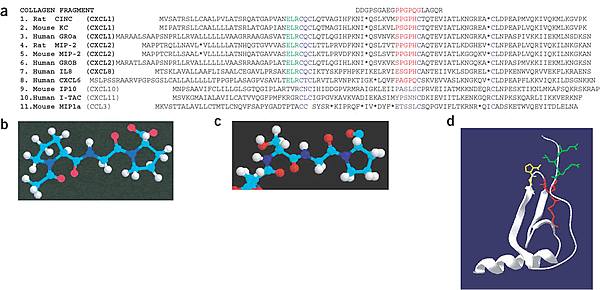
We describe the tripeptide neutrophil chemoattractant N-acetyl Pro-Gly-Pro (PGP), derived from the breakdown of extracellular matrix (ECM), which shares sequence and structural homology with an important domain on alpha chemokines. PGP caused chemotaxis and production of superoxide through CXC receptors, and administration of peptide caused recruitment of neutrophils (PMNs) into lungs of control, but not CXCR2-deficient mice. PGP was generated in mouse lung after exposure to lipopolysaccharide, and in vivo and in vitro blockade of PGP with monoclonal antibody suppressed PMN responses as much as chemokine-specific monoclonal antibody. Extended PGP treatment caused alveolar enlargement and right ventricular hypertrophy in mice. PGP was detectable in substantial concentrations in a majority of bronchoalveolar lavage samples from individuals with chronic obstructive pulmonary disease, but not control individuals. Thus, PGP's activity links degradation of ECM with neutrophil recruitment in airway inflammation, and PGP may be a biomarker and therapeutic target for neutrophilic inflammatory diseases.
Rajarathnam K. Reply to 'A novel peptide CXCR ligand derived from extracellular matrix degradation during airway inflammation'. Nat Med. 2006;12(6):603-4.
Infection or injury of tissues leads to an influx of neutrophils from the blood—an early step of acute inflammation that can be both protective and injurious. Within minutes of an insult, circulating neutrophils interact with vascular endothelium at the site of damage and begin their emigration from the blood vessels.
Henson PM, Vandivier RW. The matrix degrades, neutrophils invade. Nat Med. 2006;12(3):280-1.
| Catalog# | Product | Standard Size | Price |
|---|---|---|---|
| 072-57 | Ac-PGP / CXCR Ligand | 500 µg | $82 |
| FC3-033-41 | Interleukin 8 (IL-8), recombinant (Human) - Cy3 Labeled | 1 nmol | $1031 |
| FG-033-41A | Interleukin 8 (IL-8), recombinant (Human) - FAM Labeled | 1 nmol | $698 |
| FG-033-41B | Interleukin 8 (IL-8), recombinant (Human) - FITC Labeled | 1 nmol | $698 |
| T-033-41 | Interleukin 8 (IL-8), recombinant (Human) - I-125 Labeled | 10 µCi | $1322 |
Social Network Confirmation